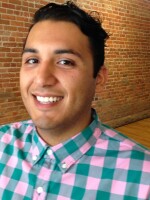Charter schools are taking off in North Carolina. Approximately 50 new charter schools have been founded since 2011 when the legislature lifted the 100-school cap on the number of charter schools. Now, the State Board of Education is considering applications for 17 more.
Charter schools are alternatives to traditional public schools. They are still public schools because they receive public money, but unlike other public schools, charter schools are run by nonprofit boards of directors. Envisioned as spaces for educational innovation, these schools are not subject to the regulations that govern traditional public schools such as class size, curriculum, school hours or teacher compensation.
WUNC education reporter Reema Khrais told Frank Stasio of WUNC’s The State of Things that “the idea was to have these laboratories of experimentation to see what works and what doesn’t work […] and to target students who may not fit certain molds.”
Advocates say charter schools offer choices to parents.
“I think it’s an equalizer,” Darrell Allison told Stasio. Traditional public schools serving low-income students often receive poor or failing grades, Allison said.
“We’re talking about hundreds of thousands of kids that are not getting the proper education because of the school that they’re zoned to,” he said. Allison believes charter schools provide an alternative to low-performing traditional public schools.
Yolanda Brown is one Durham parent who opted out of traditional public schooling for her two young boys. She enrolled them in Central Park School For Children, a Durham charter school.
“I knew that I wanted them to have the best learning experience that would fit them,” Brown told Stasio. “They have a unique way of having the kids resolve their own conflicts that is different than traditional public schools.”

Brown said she and her kids are pleased with their experience at Central Park. “I see my kids being on target and just being able to experience more than they were at the other [traditional public] school,” she said.
But charter school selection is a divisive issue. More than 40 North Carolina charter schools have closed, mostly for financial reasons or failing to serve their students effectively. Critics worry public funds follow students to charter schools at the expense of the students left behind in budget-strapped traditional public schools.
In addition, studies have shown charter schools tend to be less racially diverse than traditional public schools.

Helen Ladd, professor at the Duke Sanford School of Public Policy, led one such study. Her research found the imbalance in the racial mix of students in charters has increased since the first charters were founded in the late 1990's. Her findings mean white kids are more likely to go to majority white charter schools, and black and Latino students are more likely to go to majority black and Latino charters. Charter school critics allege the division constitutes resegregation.
Some charter schools have been proactive about ensuring a diverse group of students. Buffy Fowler, operations coordinator of the Francine Delany New School in Asheville, told Stasio the school made diversity a priority from its founding in 1997.
“When we first opened our parents and teachers were from a diverse community, and we purposefully located within the Asheville city school district to draw diversity,” Fowler said.
The school provides free transportation in order to serve students from many economic backgrounds, Fowler said. The expenses leave the school without much money to provide things like custodial staff. Teachers, students and parents take on those responsibilities, Fowler said.
John Heffernan, director of the Central Park School For Children, told Stasio that a few years ago his charter struggled with maintaining diversity.
“We were becoming a segmented school around both race and class,” Herffernan said. “One thing that compounded that was that you have a white flight from Durham public schools into Durham charter schools.”
The school worked with the state attorney for the department of public instruction and Self Help Credit Union, which lends to charter schools across the country, Heffernan said. It instituted an acceptance lottery system that prioritizes students who qualify for free and reduced lunch.
Aside from diversity concerns, critics often have concerns about charter schools that were mismanaged financially. North Carolina has had a growth of schools in North Carolina run by charter school management firm, Khrais said.
“You have critics saying that charter school leaders may be more interested in profit that in the best interests of their kids,” Khrais said.
Some charter schools are organized under large for-profit education management organizations in order to avoid such difficulties.
“It’s much more difficult for a local community based charter to get access to capital, whereas a management organization or a nationally based nonprofit will have more access to resources,” says UNC Professor Eric Houck. “I think that creates an inequality within the sector.”
The State Board of Education will vote on preliminary approval to the 17 charter school requests in June.









